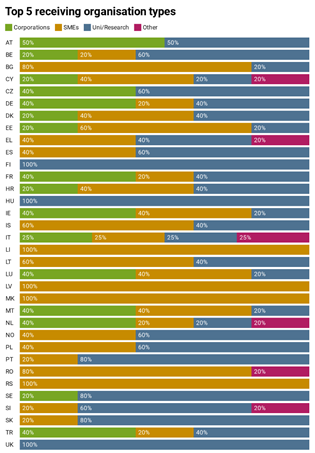Between 2018 and 2020, more than 17,000 young Europeans got the chance to improve their digital skills and embark on their first work experience in the digital domain. Thanks to the pilot phase of the Digital Opportunity Traineeships (DOTs), students and graduates travelled to one of the 34 participating countries, where they worked most often in digital marketing, software development, and data analytics.
The pilot phase exceeded by almost three times the original target and this success sets the project for a new edition. It is now part of the Digital Education Action Plan and will be extended in scope and target, including vocational education and training (VET) students and teaching staff.

The Commission launched the initiative as a concrete action to foster European digital talent. With a growing share of European companies facing difficulties in finding digital experts, the Digital Opportunity Traineeship scheme succeeded in bringing new and motivated people to jobs in digital. The pilot phase was financed by from Horizon 2020 and implemented through Erasmus+. The most active countries were Germany, Spain, and the UK. The programme now continues and will grow further fully under Erasmus+.
Participating companies used the European Union’s support to create attractive conditions for young people and helped them improve their digital skills. Most Digital Opportunity Traineeships lasted between 60 and 180 days, with some taking place over the course of one full year. In many cases, both sides were satisfied with the experience and the companies often offered standard contracts to the trainees.
Bringing more women to technology
In terms of the gender split, the DOTs pilot achieved a solid gender balance, with male participants making up 53% on average. This picture varies across the participating countries: in Western Europe, 57-59% of trainees from Spain, France and Portugal were women, while around two-thirds of the participants coming from Central Europe and the Baltics, were men. Subsequently, many Eastern European countries received more applications by women for DOTs, whereas Western Europe hosted more men (with the exception of Germany).
Women trainees were more likely to have come from non-technical backgrounds, whilst men significantly represented technology or adjacent disciplines, such as engineering and electronics.
A total of 1,165 organisations hosted Digital Opportunity Trainees, helping them explore a wide variety of sectors. Many recognisable companies participated, including: Airbus, BASF, Bosch, BMW, DeWalt, Ericsson, IBM, Infineon, Intel, Philips, Porsche, ThyssenKrupp, Volkswagen.
The majority of participants were at a Bachelor’s level (57%), followed by Master’s (31%). A minority of students were at doctoral level (2%) or at VET/Higher Diploma level (9%).

Focus on digital skills and expertise
DOT trainees typically study, or have studied, subjects that are strongly connected to digital, or disciplines undergoing digitalisation. Business, engineering, ICT, and management are the top four subjects, but interestingly also architecture and town planning come out as one of the top 5 subjects, showing the link between digital developments and societal innovation.

Universities and post-secondary institutes made up the top five senders for each country, with the majority of these being universities, in addition to some private educational institutions with a specific focus such as business, architecture, or engineering.

Based on the data sample from ErasmusIntern, the top skills that trainees developed or improved were digital marketing and search engine optimisation (SEO). This reflects the importance such work has gained in the past 5 years. Advanced digital skills represented 3 of the top 5 skills trainees were able to boost: data analytics, software use for work, and the development of apps, software scripts and websites.
Ultimately, the DOTs pilot programme achieved a demonstrable success: facilitating significant cross-border collaborations and providing thousands of students and young graduates with the opportunities to develop their digital skills, gain work experience and expand their networks, to support their future careers.
The pilot programme also proved to be the right tool for preparing a future generation of professionals: one that is motivated to drive the digital transformation in Europe and meets the needs of various industries. Erasmus+ and the European Digital Education Action Plan will build upon this successful pilot phase to expand the programme also to VET learners and apprentices, and offer professional development opportunities for teachers, trainers and other educational staff.
The Digital Opportunity Traineeships programme has provided access to careers with a strong digital skills element for many young Europeans and succeeded in engaging a number of diverse companies and institutions to invest in digital talent, providing a robust ground for future growth.
© fizkes – stock.adobe.com


